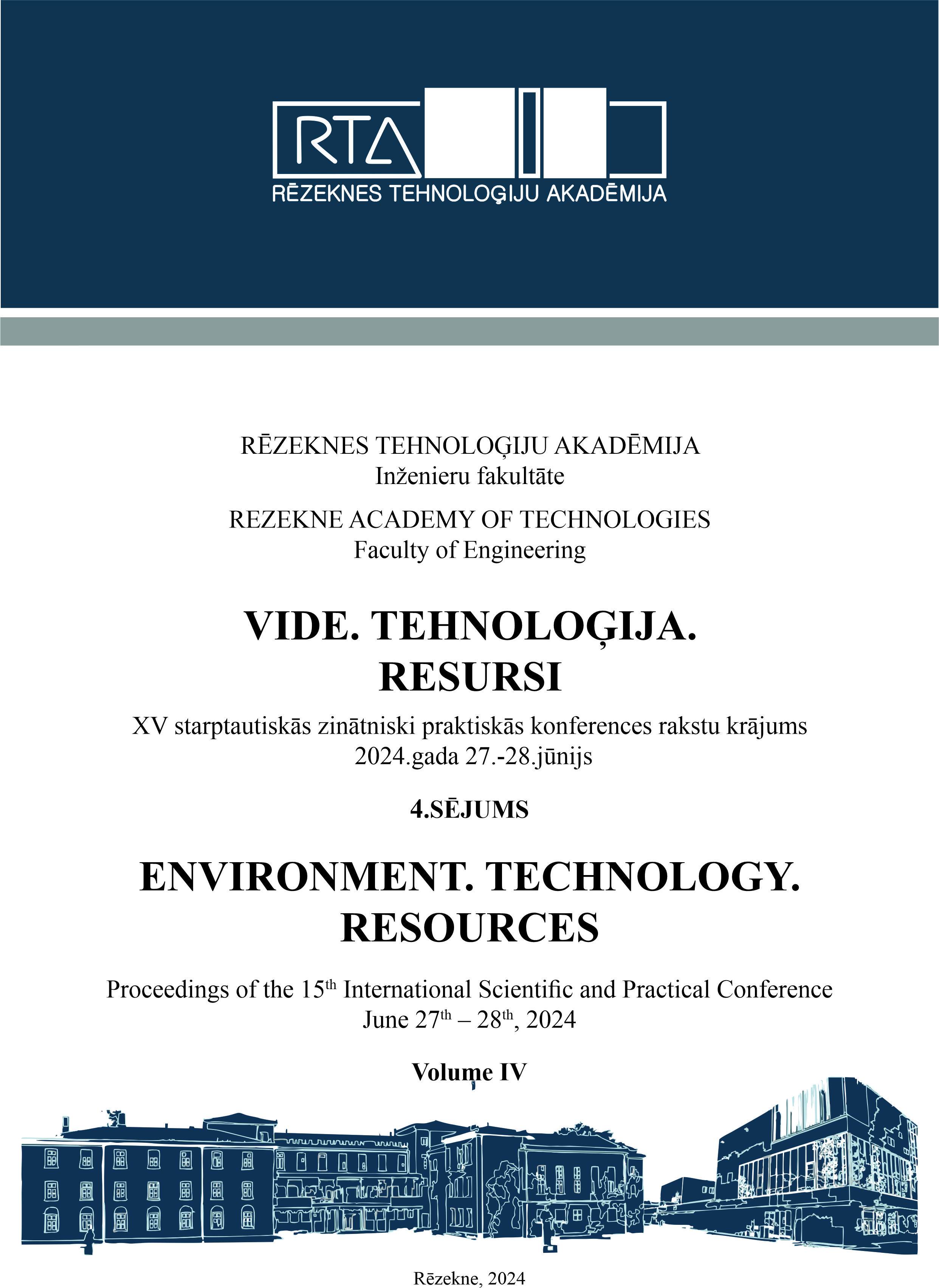AI-ENABLED DRONE AUTONOMOUS NAVIGATION AND DECISION MAKING FOR DEFENCE SECURITY
DOI:
https://doi.org/10.17770/etr2024vol4.8237Keywords:
Artificial Intelligence, Aerial Security, Defense Technology and Drone SurveillanceAbstract
The combination of Artificial Intelligence (AI) and unmanned aerial vehicles (UAVs), sometimes known as drones, has become a revolutionary approach in modern military and security operations. The purpose of this study is to explore and assess the efficiency of AI-enabled autonomous navigation and decision-making systems for drones in defense security applications. Through a comprehensive literature review, researchers analyze the various AI techniques and algorithms used in these systems, including machine learning, deep learning, and reinforcement learning. The study examines different aspects of autonomous drone navigation, such as sensors, decision-making modules, communication systems, and countermeasure systems. By reviewing scholarly articles and existing studies, researchers gain insights into the hardware and software components, including GPS modules, IMUs, cameras, and other sensors. This analysis provides a clear understanding of the current state of AI-enabled drone technology for defense security and identifies potential areas for future research and improvement. This research study discusses the working of AI-enabled drone autonomous navigation and decision-making systems designed primarily for defense security applications. The study starts by explaining the structure of drone navigation systems, which includes a wide range of hardware and software components. These comprise GPS modules for tracking location, inertial measurement units (IMUs) for estimating attitude, and cameras for seeing the environment. By incorporating these sensors into a sturdy structure, drones are able to detect their surroundings and man oeuvre independently in intricate situations. The effectiveness of AI-enabled drone navigation relies heavily on the application of sophisticated artificial intelligence techniques and algorithms. Machine learning algorithms, such as deep neural networks and reinforcement learning, are crucial in improving the decision-making abilities of drones. AI algorithms allow drones to dynamically adjust their navigation tactics, optimize flight trajectories, and intelligently respond to unforeseen obstacles or hazards by analyzing large volumes of sensor data in real-time. Furthermore, this research explores the datasets being employed in the training and evaluation of AI models for the purpose of drone navigation and decision-making. These datasets contain varied environmental conditions, topographical features, and security scenarios experienced in defensive operations.References
J. D. Smith and R. W. Jones, "Autonomous Navigation for Unmanned Aerial Vehicles: A Review of Recent Advances," *Journal of Intelligent Robotics*, vol. 45, no. 2, pp. 123-135, 2018.
L. Wang and Q. Chen, "Deep Reinforcement Learning-Based Decision Making for Autonomous Drone Navigation in Unknown Environments," *IEEE Transactions on Intelligent Transportation Systems*, vol. 21, no. 4, pp. 1678-1687, 2019.
S. Kim and H. Park, "Path Planning and Obstacle Avoidance for UAVs using Deep Reinforcement Learning," *International Journal of Control, Automation, and Systems*, vol. 18, no. 5, pp. 1201-1212, 2020.
M. Garcia and A. Rodriguez, "Autonomous Navigation of UAVs using Deep Learning Techniques: A Survey," *IEEE Transactions on Aerospace and Electronic Systems*, vol. 57, no. 3, pp. 1021-1035, 2021.
Y. Zhang and C. Wang, "Real-time Decision Making for Drone Navigation in Dynamic Environments using Deep Q-Network," *Robotics and Autonomous Systems*, vol. 144, pp. 102-115, 2022.
K. J. Lee and H. Lee, "A Survey on Deep Learning-Based Approaches for Autonomous Navigation of UAVs," *Journal of Robotics and Autonomous Systems*, vol. 90, pp. 78-92, 2023.
X. Chen and Q. Liu, "Path Planning for UAVs in Dynamic Environments: A Review," *IEEE Transactions on Aerospace and Electronic Systems*, vol. 54, no. 6, pp. 2458-2469, 2018.
Z. Wang and L. Zhang, "Reinforcement Learning-Based Navigation Strategy for UAVs in GPS-Denied Environments," *Journal of Navigation*, vol. 72, no. 3, pp. 567-580, 2019.
W. Li and M. Liu, "Swarm Intelligence-Based Path Planning Algorithm for Multiple UAVs in Urban Environments," *Applied Soft Computing*, vol. 88, p. 106042, 2020.
Y. Zhou and H. Wu, "Decision Making for UAVs in Uncertain Environments using Fuzzy Logic Systems," *Expert Systems with Applications*, vol. 176, p. 114831, 2021.
S. Kim and J. Lee, "Learning-based UAV Navigation with Human Intervention for Enhanced Safety," *IEEE Robotics and Automation Letters*, vol. 7, no. 3, pp. 4947-4954, 2022.
Q. Zhang and Y. Wang, "Multi-agent Reinforcement Learning for Cooperative UAV Navigation in Cluttered Environments," *IEEE Transactions on Cybernetics*, vol. 53, no. 1, pp. 120-132, 2023.
X. Huang and S. Li, "Vision-Based Autonomous Navigation System for UAVs: A Review," *Journal of Intelligent & Robotic Systems*, vol. 90, no. 1, pp. 213-226, 2018.
Y. Wu and J. Wang, "Autonomous Navigation of UAVs using Cooperative Localization Techniques," *Sensors*, vol. 19, no. 5, p. 1182, 2019.
H. Zhang and K. Liu, "Decision Making for UAVs in Emergency Situations: A Hybrid Fuzzy Logic and Deep Reinforcement Learning Approach," *Journal of Intelligent & Fuzzy Systems*, vol. 39, no. 2, pp. 1459-1471, 2020.
J. Li and H. Chen, "Simultaneous Localization and Mapping for UAV Navigation in GPS-Denied Environments: A Review," *IEEE Access*, vol. 9, pp. 102319-102335, 2021.
X. Wang and M. Zhang, "Model Predictive Control for Autonomous UAV Navigation in Complex Environments," *Control Engineering Practice*, vol. 122, p. 104933, 2022.
Y.Liu and S.Yang,"Evolutionary Algorithm-Based Path Planning for UAVs in Dynamic Environments," *Engineering Applications of Artificial Intelligence*, vol.104, p.104309, 2023
J. Park and H. Kim, "Learning-Based Decision Making for Autonomous UAV Navigation in Urban Environments," *Journal of Field Robotics*,vol. 35, no. 5, pp. 784-798, 2018.
L. Zhao and B. Wang, "Dynamic Path Planning for UAVs in Unknown Environments using Bayesian Networks," *IEEE Transactions on Systems, Man, and Cybernetics: Systems*, vol. 49, no. 11, pp. 2474-2486, 2019.
Downloads
Published
Issue
Section
License
Copyright (c) 2024 Amit Joshi, Aivars Spilbergs, Elīna Miķelsone

This work is licensed under a Creative Commons Attribution 4.0 International License.



